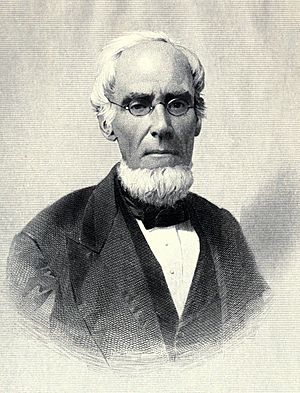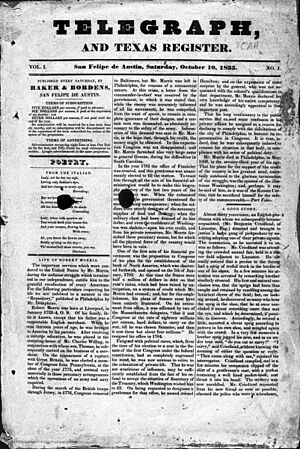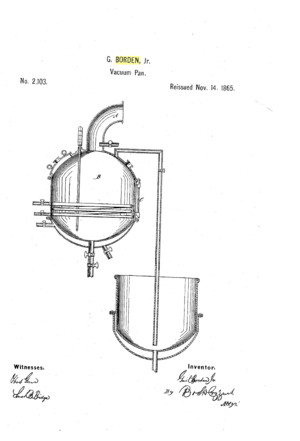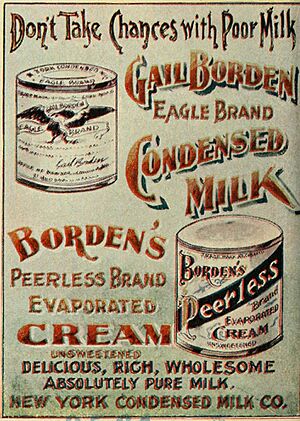Gail Borden facts for kids
Quick facts for kids
Gail Borden
|
|
|---|---|
 |
|
| Born |
Gail Borden II
November 9, 1801 |
| Died | January 11, 1874 (aged 72) |
| Resting place | Woodlawn Cemetery, Woodlawn, Bronx, New York City |
| Nationality | American |
| Citizenship | American, Mexican |
| Occupation | county surveyor, cartographer, schoolteacher, newspaper owner, soldier, politician, inventor, businessman |
| Employer | Mexican government, Republic of Texas government, self-employed |
| Known for | Inventing condensed milk |
| Spouse(s) | Penelope Mercer |
| Children | 6 |
| Parent(s) | Gail Borden Sr. (father) and Philadelphia Wheeler (mother) |
| Relatives | Thomas Borden (brother), John Borden (brother) |
| Military career | |
| Allegiance | |
| Years of service | Texian Army (1835-1836) |
| Battles/wars | Texas Revolution |
| Signature | |
 |
|
Gail Borden Jr. (born November 9, 1801 – died January 11, 1874) was an American inventor and businessman. He was born in New York but later moved to Texas in 1829. In Texas, he worked as a land surveyor and newspaper publisher. He is most famous for inventing a way to make sweetened condensed milk in 1853.
Borden's special method for making condensed milk meant it could be stored for a long time without needing a refrigerator. This was a huge help before modern cooling systems existed. He built factories in Connecticut, New York, and Illinois to make his condensed milk. During the American Civil War, the Union Army bought a lot of his milk. After he passed away, his company became known as Borden Dairy Co.
Contents
Early Life and Education
Gail Borden Jr. was born in Norwich, New York, on November 9, 1801. His parents were Gail Borden Sr. and Philadelphia Borden. When he was young, his family moved to Kentucky. There, he learned how to survey land by helping his father.
Later, the family moved to Indiana. Gail Borden Jr. only went to school for a short time in Indiana, during 1816 and 1817. In 1822, he and his brother Thomas moved to Mississippi. Gail worked there for seven years as a county surveyor and a schoolteacher.
Moving to Texas
In 1829, Borden and his family moved to Texas. His father and brother John were already living there. Gail became the chief surveyor for Stephen F. Austin, a famous Texas settler.
As a surveyor, Borden helped plan the cities of Houston and Galveston. He also worked on creating the very first map of Texas in 1835.
Texas Revolution and Newspapers
In 1835, Gail Borden and his brother John, along with Joseph Baker, started one of the first newspapers in Texas. They called it the Telegraph and Texas Planter, but it later became the Telegraph and Texas Register. This newspaper was very important during the Texas Revolution. It printed official documents and news about the war.
When the Mexican Army moved into Texas, the Telegraph was the only newspaper still running. On March 24, 1836, they printed the first list of Texans who died at the Battle of the Alamo. As the Mexican Army got closer, the Bordens quickly took apart their printing press. They moved it to safety, but Mexican soldiers later found and destroyed it.
During the war, Gail Borden Jr. is also said to have helped design the Baker's San Felipe flag. This flag was flown during the Battle of San Jacinto on April 21, 1836.
After the War and Public Service
After the war, Borden bought a new printing press. He started publishing his newspaper again in August 1836. He later moved his newspaper to the new city of Houston.
Gail Borden also served in government. He was a delegate at the Convention of 1833, helping to write early plans for the Republic of Texas. In 1837, President Sam Houston made him the Collector of Customs in Galveston. This meant he collected taxes on goods coming into Texas. He did a great job, collecting half of the government's income during that time.
Borden also helped survey and plan the city of Galveston. He worked for the Galveston City Company for 12 years. During this time, he helped sell many plots of land, which brought in a lot of money.
Early Inventions
In the 1840s, Borden started experimenting with new inventions. He tried to find a way to cure diseases like yellow fever, which was a big problem back then. He also tried to build a strange vehicle called a "terraqueous machine." This was a wagon with sails designed to travel on both land and water. However, a test run ended with people being thrown into the Gulf of Mexico, so he stopped working on it.
Developing Processed Foods
Meat Biscuits
In 1849, Borden began working on a new food product: a dehydrated beef called the "meat biscuit." This was similar to pemmican, a dried food used by Native Americans. He hoped to sell it to gold miners and military groups. The meat biscuit even won an award at the 1851 London World's Fair.
He built a factory in Galveston and invested a lot of his own money. However, people complained about the taste, and the U.S. Army found it didn't work well. Borden's business failed, and he faced financial difficulties in 1852.
Condensed Milk
In 1851, while returning from the London exhibition, Borden saw cows on his ship get sick and die. Children who drank their milk also became ill. This made Borden want to find a way to preserve milk safely.
He was inspired by a "vacuum pan" he saw being used to condense fruit juice. He learned how to remove water from milk without burning or curdling it. After trying a few times, he finally succeeded with a factory built with his new partner, Jeremiah Milbank, in New York. This factory produced milk that lasted a long time without refrigeration.
In 1856, Borden received a patent for his milk condensing process. He set strict rules for farmers who wanted to sell him milk. These rules, called the "Dairyman's Ten Commandments," included washing cows' udders and keeping barns clean. This helped ensure his milk was pure and safe.
By 1858, Borden's condensed milk, sold as Eagle Brand, became very popular. He met Jeremiah Milbank, a wealthy financier, who invested a lot of money into Borden's business. Together, they founded the New York Condensed Milk Company.
The American Civil War (1861-1865) greatly increased the demand for condensed milk. The Union Army bought huge amounts for their soldiers. Borden quickly expanded his company, building many new factories. He also allowed others to use his patent to make condensed milk. Even with fast growth, Borden always insisted on strict cleanliness. Many of his cleanliness rules are still used today.
Borden also experimented with condensing other foods like meat, tea, coffee, and cocoa. He even patented a way to condense fruit juices in 1862. But condensed milk remained his most successful product.
Personal Life
In 1828, Gail Borden married Penelope Mercer. They had five children together. Penelope died in 1844 from yellow fever. Later, Borden married Emeline Eunice Eno Church.
Death and Lasting Impact
Gail Borden died on January 11, 1874, in Borden, Texas. He was buried in Woodlawn Cemetery in New York City.
Several places were named after him, including Borden County and its county seat, Gail. The town of Borden, Texas, was also named for him.
In 1899, the New York Condensed Milk Company changed its name to honor Borden. It became a very successful company, growing to employ thousands of people and selling many different products. Today, a version of the company, now called Eagle Brand, still exists.
In 1892, Borden's stepsons bought and donated a mansion to create a new library in Elgin, Illinois. They asked that it be named the Gail Borden Public Library in his honor.
Genealogy
Gail Borden was related to some other notable people. He was a distant cousin of Robert Borden, who was Canada's Prime Minister during World War I. He was also a distant cousin of Lizzie Borden. One of his great-grandchildren, also named Gail Borden, was an American figure skater who competed in the 1932 Winter Olympics.
Patents
- U.S. Patent RE2,103; November 14, 1865; Improvements in Condensing Milk
 | James Van Der Zee |
 | Alma Thomas |
 | Ellis Wilson |
 | Margaret Taylor-Burroughs |







